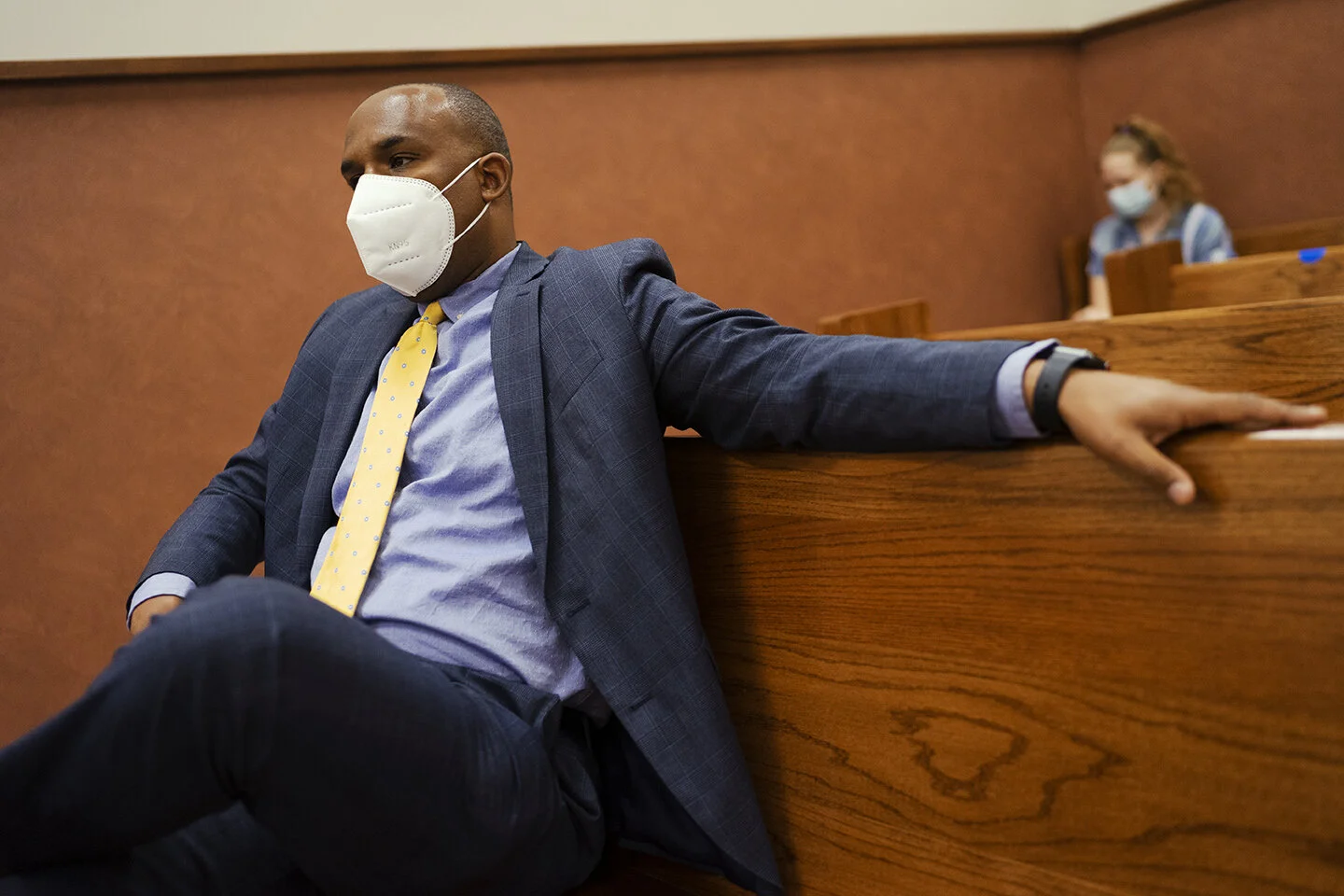THROUGH A TENSE SUMMER, DA SCOTT COLOM PRIORITIZED TRANSPARENCY AND OPEN DIALOGUE
Scott Colom’s mother doesn’t want him boxing competitively.
If not for that, and strenuous work obligations, the 38-year-old district attorney for Mississippi’s 16th circuit court district would have no problem climbing in the ring to try his skills against local talent.
“My mom won’t let me actually box,” said Colom, now almost a year into his second term as DA. “I don’t mind getting knocked down. It’s one of those things that I could say, ‘I did it.’”
Dorothy Colom is well aware of her son’s toughness and willingness to fight. She even thinks he might do pretty well. But mothers are mothers, after all.
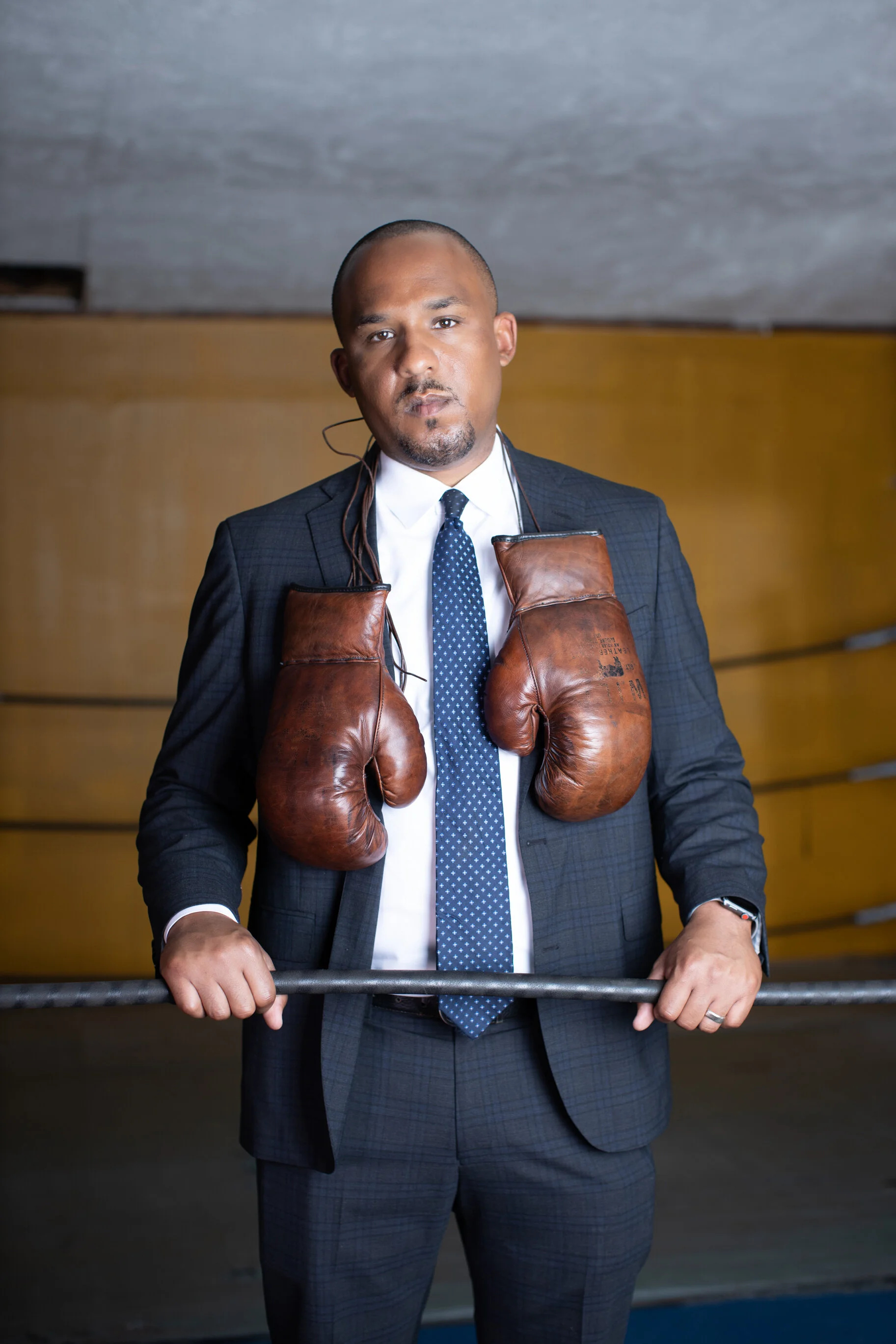
“I enjoy boxing. I watched it with my father growing up. But I don’t want to see anyone physically beat up on my son,” laughed Dorothy
Scott generally trains with one of his assistant district attorneys, Marc Amos, at Oliver Miller’s gym on College Street. Sparring sessions between the two lawyers, “friendly” as they may be, are a handful for Scott – he gives up close to six inches and 100 pounds to the 6-foot-2, 265-pound Amos.
Both admit Amos holds back – a little.
“I’m not sure you want to hit your boss with everything you’ve got,” Amos laughed. “There are weight classes for a reason. I can’t move as fast as he can, and I’m not sure he can hit as hard as me.”
In Scott’s office downtown, a pair of leather boxing gloves hanging on the wall behind his desk represent his fighting spirit, although they are not for use at Miller’s gym. They were a gift from Scott’s twin brother, Andrew, that came with a reminder of how to look at life.
“Don’t be afraid to fight,” Scott recalled his brother saying. “Also, know how to duck a punch.”
Hanging beside the gloves is a framed photo of Levon Brooks and Kennedy Brewer – Noxubee County men wrongfully convicted of murder in the 1990s who both served nearly two decades in prison before DNA evidence finally cleared their names. Scott was a pre-teen when those men were sentenced, but their experience with the justice system helps guide how he prosecutes.
“I keep that there to remind myself that the stakes are very high,” he said. “In my decision-making, I can never forget that.”
It’s May 28.
The officer-involved killing of George Floyd in Minneapolis three days before freshly resonates with many Americans, Scott included, as do the demonstrations across the country protesting police brutality against African Americans. Some of those demonstrations have become violent.
Scott’s cell phone rings.
A representative with the office of Mississippi Attorney General Lynn Fitch tells Scott the state is dropping the manslaughter charge against Canyon Boykin – a white former police officer who fatally shot 26-year-old Ricky Ball, a Black man, following a traffic stop in Columbus in October 2015. It is the first communication Scott has received about the case since Fitch took office in January.
“I was pretty shocked by it,” Scott said. “I immediately thought, ‘That’s going to be a huge problem.’”
He asks for an explanation, but gets little more than “lack of evidence” in response.
“I told them they really needed to reconsider how they were going to do it,” he recalled. “I said if there was any way, they should hold off and do it in a way where you could have a hearing, explain your reasoning and give the public an opportunity to observe what’s going on, even provide some evidence.”
Fitch’s employee tells Scott the decision has been made and the judge has the order. This, she tells Scott, is just “a courtesy call.”
Afterward, Scott starts thinking of what he can do to tamp down the prospect of violence erupting in his hometown. Ball’s killing sparked rumors and unanswered questions for nearly five years.
“If you saw what happened around the country, that (following) weekend was the worst weekend,” he said. “There were protests in every major city. There was some destruction of property, clashes with police. It doesn’t take much for one or two people to take it to that level here.”
The next day, Scott holds a press conference at Lowndes County Courthouse, similar to the one he held in 2016 when he announced he was turning over the Boykin case to then AG Jim Hood’s office rather than handling it himself. At this press conference, though, he says he will fight to get the case file and make it public.
That Saturday, he sees on Facebook where a peaceful demonstration will gather in the Leigh Mall parking lot. Scott goes, eager to show the protesters someone in the legal system is willing to listen. He ends up speaking, doubling down on his commitment to make the case file public.
City leaders, including the mayor and police chief, are there. Scott said they monitored the situation but “gave protesters their space.”
“Even they made very clear that they didn’t believe this was handled in a way that was appropriate,” he said.
Over the weekend and in the following weeks, other local protests emerge. All are peaceful.
“The fact that it did not get violent in Columbus goes to the people who were leading the protests,” Scott notes. “They were leading in a way that called for action (getting the file, asking the judge to reverse the order). […] So my thing was let’s focus on what we can control, instead of having people frustrated and wondering if there was something we could do.”
“It was an important moment in the history of Columbus where the people showed what type of community we have,” he added.
David Horton, a Columbus native who organized not only the Leigh Mall demonstration but has continued to be an activist locally for racial justice, knew people could no longer be complacent with the status quo.
“We knew that if we didn’t do something, somebody would,” said Horton, who lives in Atlanta but visits family back home frequently. “We wanted to provide an opportunity for people to express their feelings, but we didn’t want those feelings to manifest in a way that would hurt the city.”
Having a bridge, a mediator, from the legal system, he said, made that task much easier.
Fitch’s decision, alone, could easily have sparked the social unrest many cities were seeing on a nightly basis. But even as more reasons for tension continued to build – and fewer people were willing to be silent in their displeasure – peace persisted. As did Scott.
Scott continued to speak out through the summer as the debate about relocating Confederate monuments displayed on public spaces came to a head. He spoke out against a Lowndes county official who, while explaining his reasons for wanting to keep a monument on the courthouse lawn, made blatantly racist comments against Blacks. He organized community forums in Columbus with panels of public officials, business and civic leaders – Black and white – aimed at engendering more mutual understanding and empathy.
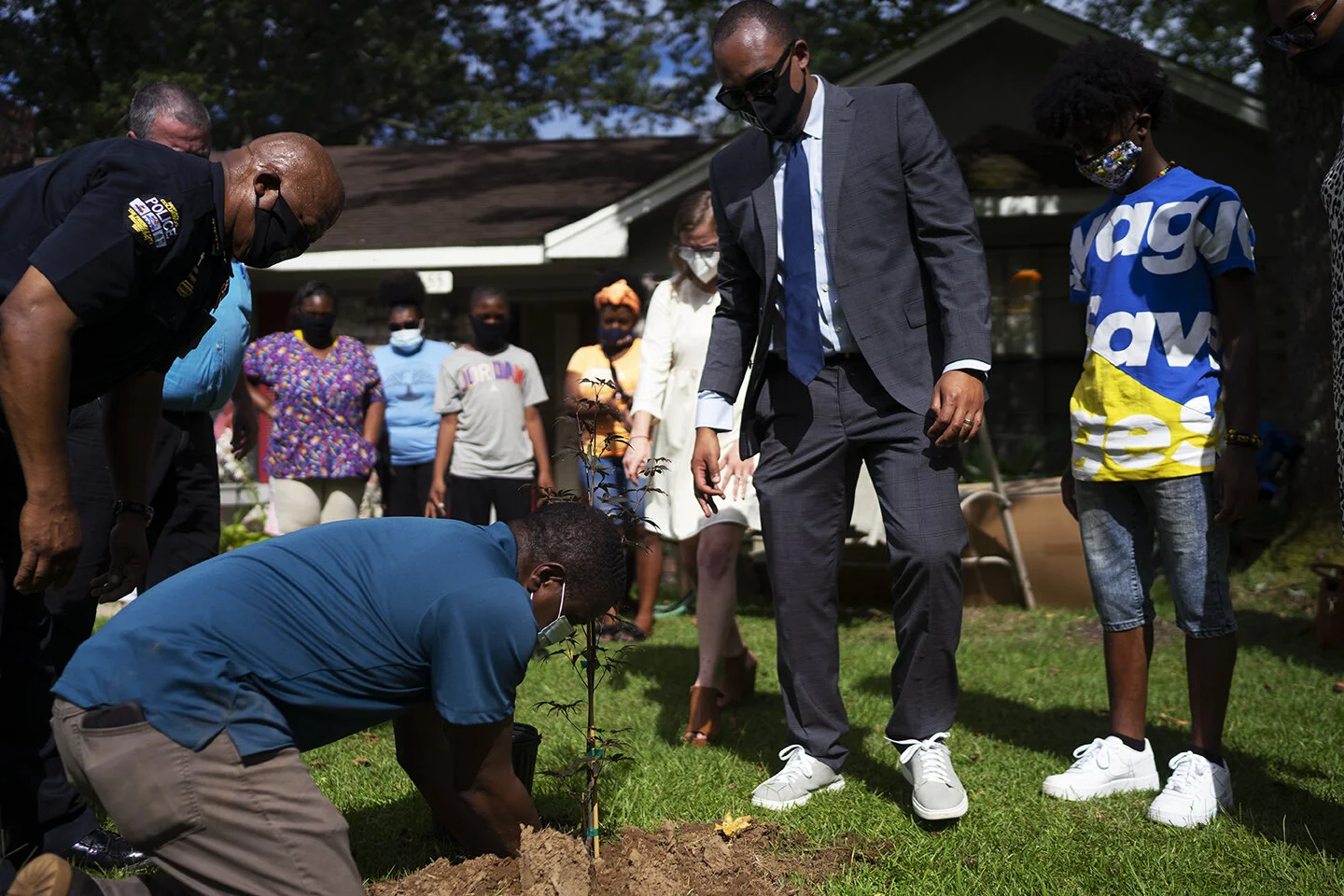
“When you have someone in the legal system who not only wants to hear the people’s desires and feelings but will also clearly explain how the system works, that puts people in a better position to see things from more than just their own perspective,” Horton said. “It gives you the chance to have a conversation where the two sides are listening to one another instead of screaming at each other.”
Scott was “born on third base.”
His father, Wil, has practiced law in Columbus for 43 years. Dorothy served 24 years as the district’s first African-American chancery judge, retiring from the bench in 2019.
But as prominent as law was in his home, Scott was a long way from a law career when he was suspended from Columbus Middle School as a seventh grader for fighting at a football game. He and his brother spent the next two years at boarding school. When he returned to Columbus for high school, the star point guard for the Falcons spent his time thinking about “girls and basketball.”.
When it came time to apply to colleges, Scott had narrowed his choices to two: Louisiana State University, the nation’s top “party school” that year; or Millsaps College in Jackson, where he could play basketball. His mother nudged him toward Millsaps.
Double-majoring in English and history, Scott eventually started turning away from basketball and toward the family craft. By his senior year, though dubbed a starter, he left the basketball team to focus on his studies. After graduation, he spent 18 months teaching English in Guyana, what he calls the most impactful thing he’s ever done.
His parents agree.
“It was a remote village with no running water, and only two hours a day of electricity by generator,” Wil said. “When he got there, it was a shock to him. After he came back, he was quite different.”
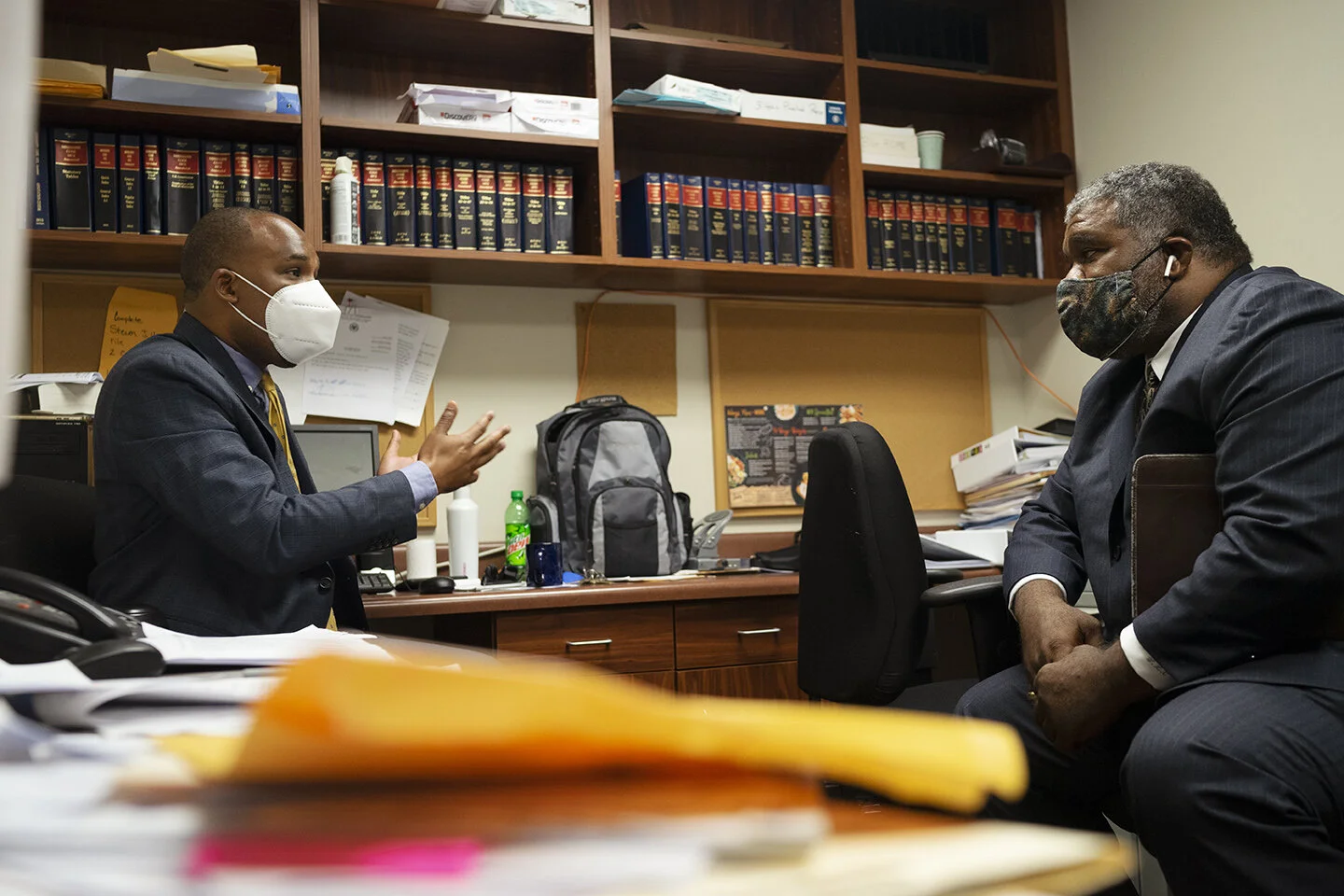
Scott went to law school at the University of Wisconsin, graduating cum laude. He had offers to work at law firms in New York, Chicago, other larger cities. Instead, he chose to come home to Mississippi, and later home to Columbus where he worked with his father and also served as Justice Court judge.
“We’re the most underrated state in the country,” he said. “We have so much promise, so much potential. I feel like there’s a camaraderie here among the people trying to push the state forward that you don’t have other places.”
In 2015, with his family fully supporting his run, he defeated 26-year incumbent Forrest Allgood by a 54 to 46 percent margin, becoming the first ever Black district attorney elected in a majority white district in Mississippi. He was re-elected unopposed four years later.
“I try to remember with my job that my start is unique to most people,” he said. “Even with that start, I made a lot of bad decisions. So imagine, without that start, what kind of decisions I would have made.”
It took Fitch’s office less than a week to turn over the Boykin file, and Scott’s office publicly released body camera footage, witness statements, medical examiner’s reports and other evidence by mid-June. Releasing the file did not replace a trial, which Scott believes should have happened. Getting a conviction on that evidence, however, would have been difficult, he admits.
“The vast majority of the community would have been satisfied (with a trial),” he said “If the jury didn’t convict, I think you would have had some people upset, but (most) would understand that at least (the family) got a chance to let the jury decide it.”
Even so, Amos notes, releasing the file offered clarity he believes curtailed possible unrest.
“You didn’t see a lot of protests after we put that out. If you create a void of information, people will fill it with conspiracy theories,” Amos said. “What Scott did was fill the void with facts. I think the public appreciated it.”
The Boykin case also brought a policy change to Scott’s office. Part of his platform in his first DA election campaign in 2015 held that he would turn over officer-involved shooting cases in the district to the AG’s office. Independent prosecutors don’t work as closely with local law enforcement, he thought, so they were less likely to be perceived as “hanging the public out to dry.”
In the four years Hood’s office worked the Boykin case, he didn’t regret his decision to hand it over. Now, he’s vowed to take those cases himself moving forward.
“I saw the potential risk and harm from a person not being accountable to the decision,” he said.
At home with his two daughters – Luci, 4; and Brooklyn Madison, 2 – Scott has something of a soft side.
“They definitely bring out the more patient and calm side of him,” said his wife, Nadia, a West Point native whom he married in 2014.
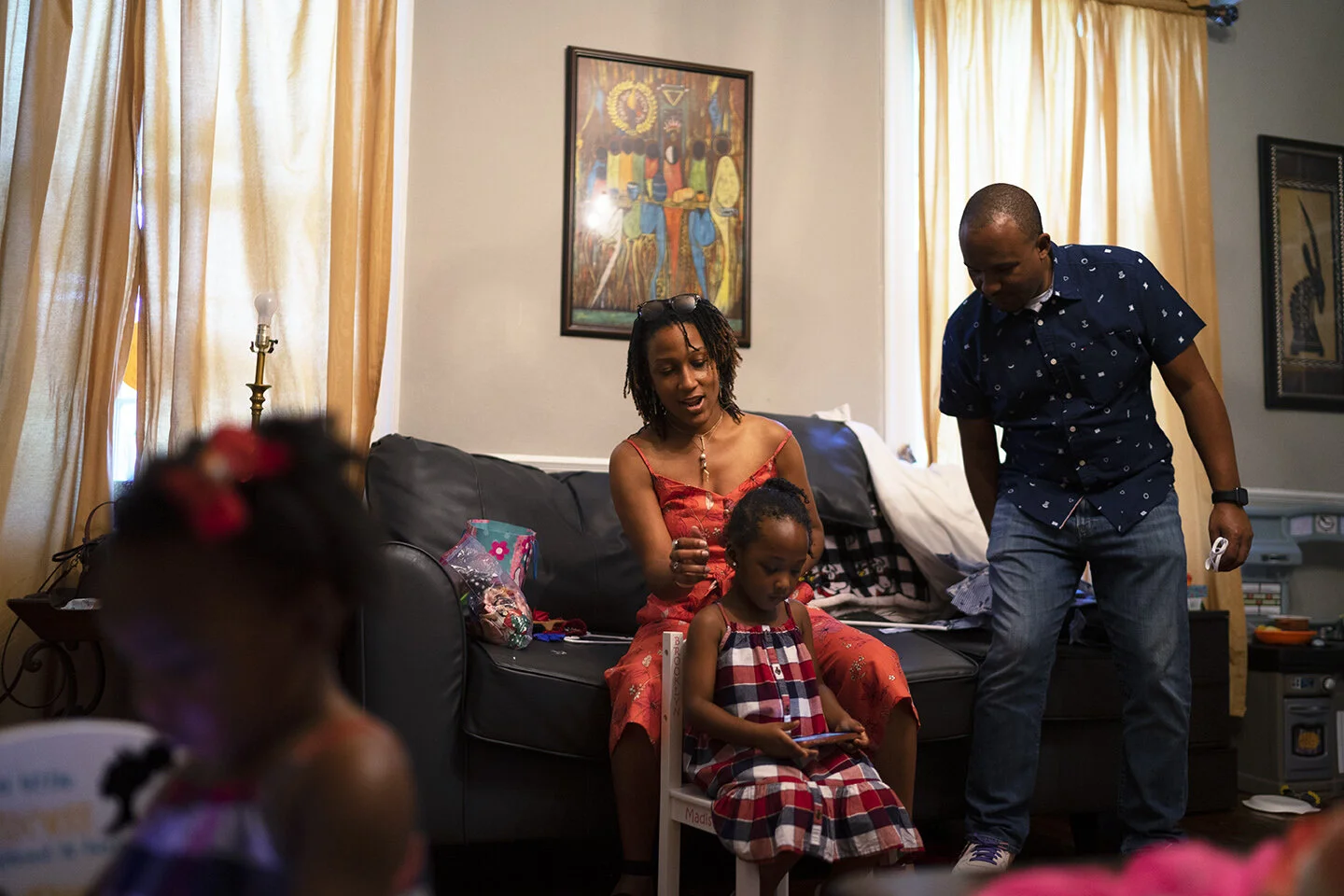


What they represent is a generation Scott hopes will drive Mississippi’s, and the nation’s, social progress even further.
Scott said he wants to be a good example of a Black leader, but he looks for a more racially integrated society to, over time, take the wind out of systemic racism – especially in the criminal justice system.
Part of that process is speaking truth to power.
“I don’t have a problem saying George Floyd was murdered,” he said. “I don’t have a problem saying that there are many examples of police brutality across the country that are on video that are not things we can tolerate in America. I always just follow the truth.”
Another part is looking at the future with optimism, even in Mississippi.
“We have so much potential because of the nature of our diversity,” Scott said. “Slowly and slowly, we’re breaking down those stereotypes, those prejudices and those biases. Once people see that another person isn’t different from them based on their race, I just feel like the sky is the limit.”
Wherever the Coloms’ children end up, Nadia said there’s value in their growing up here.
“This is home,” she said. “We have a stake here and in whether it gets better.”
STORY BY ZACK PLAIR
PHOTOS BY LEDRICO ISAAC & ANTRANIK TAVITIAN


